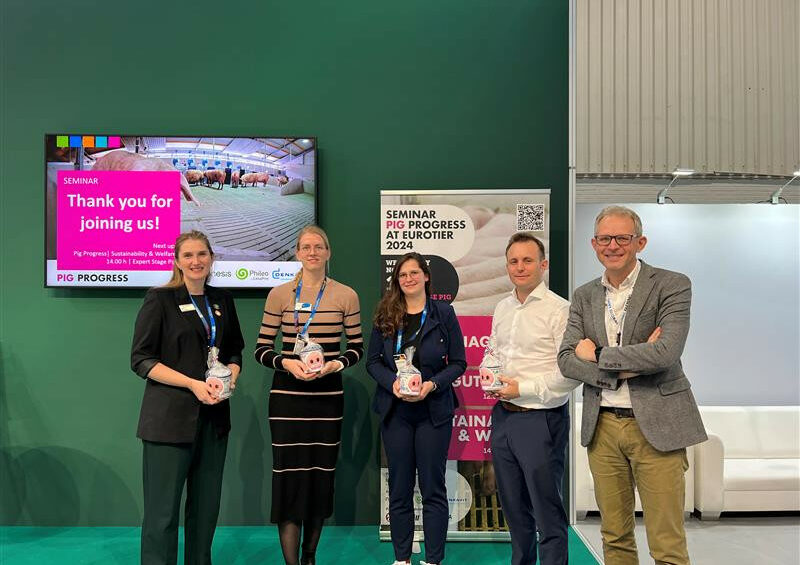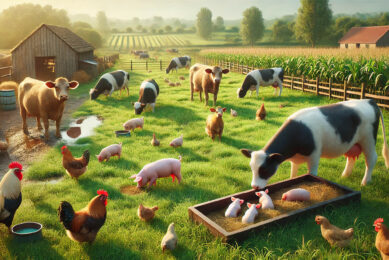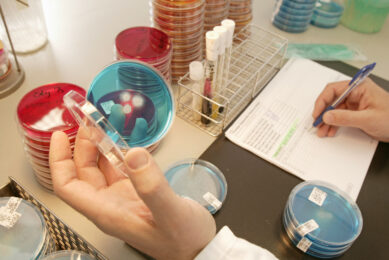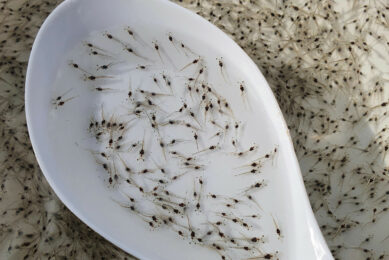On-demand: Seminar about Gut Health

The 2nd of 3 Pig Progress seminars at EuroTier in Germany was called “Gut Health.” A full house listened to presentations by 4 expert speakers on Wednesday, November 13. The recording can be reviewed in its entirety, free of charge.
Click here to view the Gut Health seminar at EuroTier on demand
The pig’s gut is where virtually all disciplines of pig science converge. This is where nutrition is absorbed and where bacteria and pathogens could challenge the pig’s health. Additionally, feed efficiency has long been a major component in pig genetics. What is less widely known, however, is that gut health also has a behavioural component.
Gut health and tail biting
The introductory presentation was given by Jessica Schynoll, veterinarian at veterinary practice Vivet Schweinegesundheit, based in Germany. Her practice has a lot of attention for the effect of gut health on pig behaviour and in particular tail biting. From scientific literature it is known that the gastro-intestinal microbiome has an influence on behaviour, well-being and health.
She discussed that there are different forms of biting behaviour, for instance tail biting, flank biting or ear biting. Her hypothesis is that a dysbiosis in the gastro-intestinal microbiome promotes the colonisation of the gut bacteria Lawsonia intracellularis, causative agent of ileitis. As a consequence, the pig may feel suboptimal, and through the microbiome-gut-brain axis that could translate into searching, belly nosing and biting.
The team therefore aimed to try to orally vaccinate against L. intracellularis. The team therefore did a trial in an organic farm where in some groups ileitis vaccination was stopped. In the non-vaccinated group, the mortality was 7.06% (vs 1.24% in the vaccinated groups), she said – and that was not just related to ileitis, but more to tail biting-related infections that required euthanising of certain pigs. Also the days to finish were longer in the non-vaccinated group and average daily gain was lower.
A robust pig gut microbiome
Next on stage was Dr Lea Hübertz Birch Hansen, global technical product manager, swine at Novonesis. She defined “microbiome robustness” as the ability of the intestinal microbiome to adapt to changing conditions in order to maintain microbial balance and productivity.
She went on to ask the question how the sow’s gut microbiome influence litter performance. Dr Hansen pointed out that probiotics modulate the microbiome. In sows that were not administered with probiotics, enteric pathogens were “differentially abundant.” In other words, she concluded, “initial evidence suggests that effective biosolutions can notably alter the European sow gut microbiome and decrease the prevalence of commonly pathogenic species.”
Beneficial role of yeast probiotics
More input about the use of probiotics in sows followed in the next presentation by Oliver Merdy, global program manager swine at Phileo by Lesaffre. His message came down to the conclusion that a better sow health leads to better microbiota, better colostrum and better and more milk. This, in turn, translates into piglet quality.
He pointed to the beneficial role of a yeast probiotic to promote an increased abundance of beneficial bacteria – this would lead to better nutrient metabolism, gut health as well as control of pathogens. Yeast probiotics can compete with pathogenic bacteria at the surface of the gut epithelial cells, he explained. In addition, it would reduce pathogen pressure by preventing their adhesion to the intestinal epithelium. Last but not least, this would also help reduce the production of harmful metabolites.
Holistic approach on feed ingredients
“Bringing value to pig farming,” was the title of the last presentation in the Gut Health seminar. This talk was delivered by Margriet Faber, technical sales manager feed additives at Denkavit. She emphasised that a holistic approach on feed ingredients is vital in order to assure a good health quality, as causes and effects are abundant. Her approach also started with sows and she talked about a combination of resin acids and fermentable lignocellulose in the lactation feed, to reach more live-born piglets and more viable piglets. She also discussed the addition of the feed additive Terragut (based on minerals) in piglet feed for better faecal consistency after weaning and a better feed conversion ratio (FCR).
Click here to view the Gut Health seminar at EuroTier on demand











